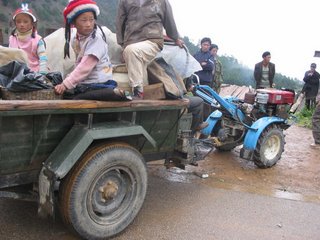The Grapes of Wrath

Steinbeck writes during a time where the land was undergoing a violent transition from small farm holdings on which families eked out a living, to large, commercial, technologically advanced operations which leached the land of nutrients with repeated cashcrops like cotton, and then when it was no good for anything else, subdivided much of it into suburbs.
The modern, gleaming, tractor which methodically punches seeds into the ground is an iron monster 'raping methodically, raping without passion'. Its driver, a robotic extension of the machine he operates, 'could not see the land as it was, he could not smell the land as it smelled: his feet did not stamp the clods or feel the warmth and power of the earth. He sat on an iron seat and stepped on iron pedals...The land bore under iron, and under iron gradually died; for it was not loved or hated, it had no prayers or curses.' (ch. 5, Grapes of Wrath)
The modern, gleaming, tractor which methodically punches seeds into the ground is an iron monster 'raping methodically, raping without passion'. Its driver, a robotic extension of the machine he operates, 'could not see the land as it was, he could not smell the land as it smelled: his feet did not stamp the clods or feel the warmth and power of the earth. He sat on an iron seat and stepped on iron pedals...The land bore under iron, and under iron gradually died; for it was not loved or hated, it had no prayers or curses.' (ch. 5, Grapes of Wrath)
My students are at first innocently perplexed that the description of the tractor driver's lunch in the story is intended to be derogatory. How could he not 'relish' his white bread sandwiches wapped in waxed paper, the 'spam' and 'pie branded like an engine part'? Surely this is a delicious and privileged lunch? I pause, looking over their faces, before attempting to defend my understanding of Steinbeck's intent. And in that pause I feel my otherness, and I sense the harsh, peasant life that snaps at their parents heels, and from which consequently those parents have strived to free these - their children.
Often the culture gap is also a time warp. I grew up in the '50s when this same adulation of modernity which I see now before me, was at its peak, when parents, still haunted by the depression of their childhood, embraced TV dinners and instant cake mixes as fashionable and time saving advancements.
Soon I'll walk down to the market and buy bokchoi, broccoli, mint, lotus root and aubergine. The brown wrinkled hands that place these dripping purchases in mine, will most likely also have picked and washed them this morning. My students smile indulgently if they happen upon me returning home wearing my Naxi cane backpac which I have adopted as the most practical way to transport my produce.
Progress. Nick's ardent lines give it such a rosy hue:
Out of sorrow empires have been built
Out of longing great wonders have been willed.
I've actually misquoted the great man. It should be, " out of sorrowin' towns..." but you have to admit my take is an improvement.
(Nick Cave; 'Are you the one that I've been waiting for' from 'The Boatman's Call.')



3 Comments:
"don't it always seem to go / that you don't know what you've got 'til it's gone"
— Joni Mitchell; from 'Big Yellow Taxi'
I had similar experiences and emotions in places as diverse as Mongolia, Estonia, parts of the former East Germany, and, of course, China. It seems like the same dilemma that pervades so many aspects of life and cultures: if you or your culture are lucky and privileged enough to have learned some uncomfortable lessons, you can't teach, tell, or convince others about what you've learned until they've learned the same lessons themselves.
But does my conclusion have any greater validity than anyone else's, no matter how strongly I might feel it? Sometimes I think all that can be done is try to present another perspective and hope a few people will arrive at the same conclusion. If you weren't offering a different perspective to your students, would anything disturb their striving towards an impossible future?
Great post, Jacq.
Yep.'My perspective', now there's a concept. Everything I feel, think and then say about this place seems so ignorant. But I muddle on...
hi jacq. i am in wholehearted agreement pete. we learn, if we learn at all, from our *own* experience. added to this - context interprets every lesson. i like your use of steinbeck's work to encourage your students to think about issues beyond the literary.
Post a Comment
<< Home